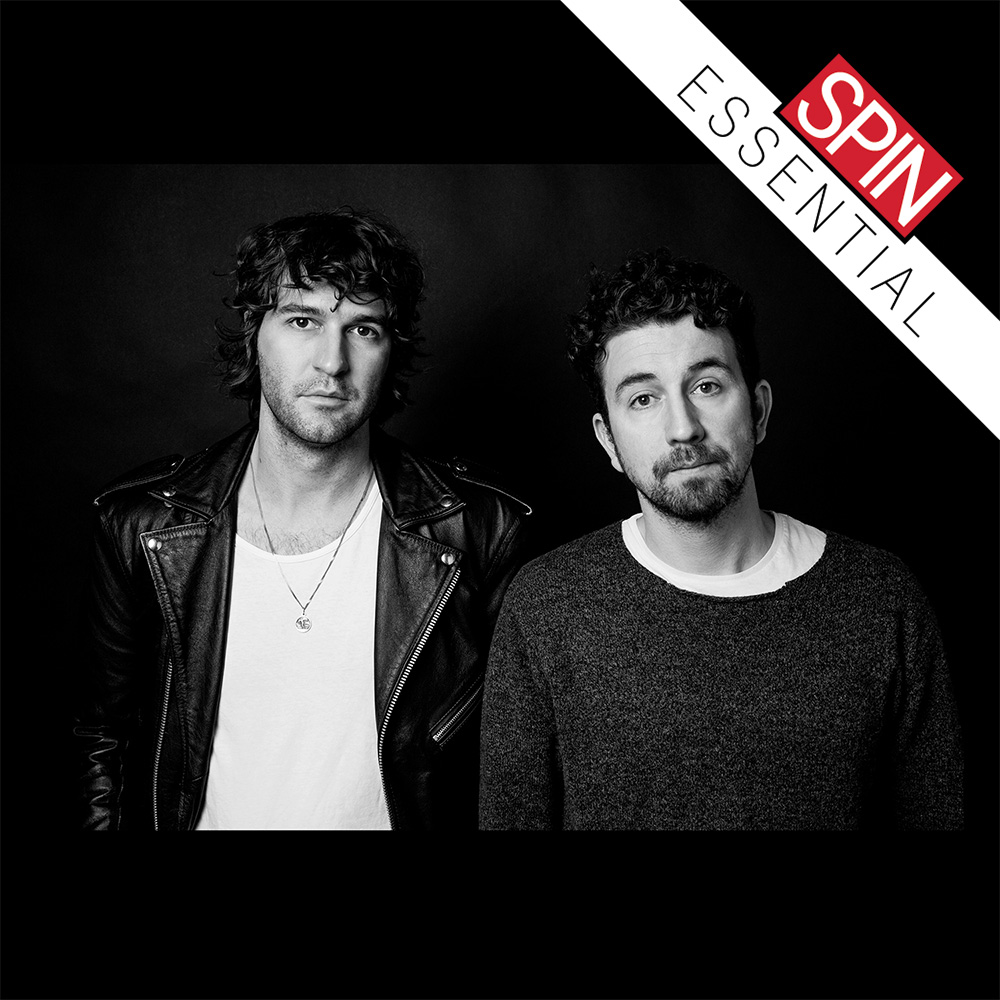There are Japandroids fans who talk about their memories of the band like veterans reminiscing about fighting in the Great War, and that nostalgia is not easy to dismiss. Japandroids took the most elemental rock tropes and blew them up big enough to cover skyscrapers. Their songs evoked Manichean worlds where the girls were mostly good but sometimes very bad, where the alcohol was always flowing and the music was a vessel to emotional states both deeply sad and blindingly alive. Standing in the pit with your boys, your boys’ boys, the boys leaving town and the boys coming back, screaming along until your feral alcoholic state broke—it was a lot, and not for nothing could they be seriously referred to as a safe space for male friendship.
The five years following 2012’s Celebration Rock saw vast demand for a new record, even as their kind of rock—inspired by muscular, masculine riff factories like Thin Lizzy and AC/DC—rapidly ceded cultural relevance to more politically valuable genres. But Japandroids fans will be happy to know that Near to the Wild Heart of Life is a Japandroids album, pushed to 11 even in the quiet moments: towering riffs played on maxed-out amps, drums hit with due diligence, big whoa-oh harmonies, passionate, evocative rock n’ roll songwriting about girls and alcohol.
Japandroids always walked that Springsteen-paved line between corny and genuine; they tilted toward earnestness because of guitarist Brian King, whose boyish, spirited voice sold his ideals like someone confiding secrets after a few rounds. The first verse on the album–“The future’s under fire / the past is gaining ground / A continuous cold war between my home and my hometown”–either forces an eye roll or sucks you all the way in. If you’re even a little on board with this type of music, your heart will be fully invested by the second verse in second song “North, East, South West,” where King sings, “Hot and heavy when I hit the hay / in N-O-L-A, USA,” the band chanting each letter like cheerleaders heading a rally. Their insistence in making this kind of music carries no trace of self-consciousness, or self-deprecation. They remember a really important thing: This music stays powerful only if you never break kayfabe by admitting the obvious, which is that it can feel occasionally silly to be an adult drawing passion from rock n’ roll about girls and alcohol.
The delay between albums wasn’t spent being precious. “I don’t consider myself to be a very creative person,” King told Pitchfork in 2012. “We have to work really, really hard to write a song we think is really good.” In the time off, the members found stable relationships and by their own accounts, grew out of the sepia-toned sentimentality shading their earlier music, which throbbed on end for times long gone. (They were in their late 20s when they released “Younger Us,” a song about missing your early 20s.)
But though they’ve publicly distanced themselves from the people they used to be, their approach is still intensely dramatic. There is nothing subtle about this album; every battle is waged on an epic scale, light and dark clashing against each other through Biblical metaphors. By comparison, their early songwriting seems minimal—they once built an entire song around the line “after her / I quit girls” looped over and over again. Here, they’ve expanded on the beat lyricism of 2012’s Celebration Rock by continuing to write about sinners and the saints, journeys and the journeymen, demons and drifters, mezcal and memories, the whole hokey Waits-ian tableau sculpted into feverish narratives. They write about real companionship, too, and the occasional clunky phrase might be forgiven because of the utter passion of their belief in the absolving qualities of love.
For all the descriptive language they use, descriptive language can’t really adequately evoke how much beautiful, blown-out noise is produced by these two people, how much better they are at this than dozens of bands who’ve tried. My favorite sound is the wordless yawning in between the verses of the title track, which sounds more like a sustained, undulating roar than a riff. I love how “No Known Drink or Drug” slowly creeps to a full sprint; the way “True Love and a Free Life of Free Will” paces itself like a marathon runner pushing his way up a mountain; the melancholic loop on “I’m Sorry For Not Finding You Sooner,” which locates the band somewhere between Guided by Voices and Grouper. (I don’t have a car, and I don’t run as a point of laziness, so I can only imagine how good this album sounds in actual motion.) The minor additions—the acoustic guitars leading “In a Body Like a Grave” and “North East South West,” the robotic synth tones supporting “Arc of Bar”—show how much range there’s left to explore inside the same two-piece attack that keeps coming over and over… and over and over again.
I have my own embarrassing, soggy Japandroids memories involving the boys of my life, and I get that this stuff is exceedingly boring to hear about for people who don’t, or can’t, fetishize such release. This music is most essential when it’s actually happening, and the band seems highly aware that their moment might be over. Rock isn’t dead, obviously, even if it doesn’t go platinum; it continues to be made en masse,and this shift seems just as attributable to media trends as consumer interests. As mainstream tastemakers have finally caught wise to an alternate canon elided in magazines and websites past, it almost seems impossible that another unapologetically apolitical rock band could receive a full-throated endorsement without a dozen caveats, like the ones you’re reading now on SPIN.com. That’s fine, truly—moments don’t need a reason to end. But it’s very reassuring to be reminded, as with this record, that when you go forward, something new could always happen.





